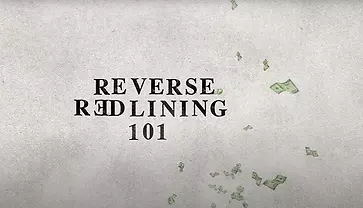Combating Predatory Lending in New York City
In a significant victory in the fight for fair lending, Relman Colfax secured a major jury verdict against New York-based Emigrant Savings Bank and Emigrant Mortgage Company for discriminatory mortgage lending. The June 2016 liability verdict was both the first case in which a jury held a bank accountable for lending practices that contributed to the country’s 2008 financial collapse, and the first reverse redlining case ever to be tried in federal court
The firm represented eight Black and Latino borrowers who had been exploited by Emigrant’s predatory loan program. Over the course of two trials, our lawyers presented significant evidence that Emigrant targeted Black and Latino families in Brooklyn with grossly unfavorable loans. The defendants’ practice of unfair and deceptive loans was a textbook example of reverse redlining—targeting minority communities with loans that were destined to fail, leaving borrowers and their families almost certain to lose their homes or face foreclosure proceedings.
On February 19, 2025, the United States Court of Appeals for the Second Circuit entered a final judgment awarding four homeowners $722,044 in compensatory damages and four others nominal damages.
Background: Emigrant Targets Minority Neighborhoods for Predatory Loans
Between 1999 and 2008, Emigrant issued mortgage refinance loans under its STAR NINA program, which was designed exclusively for borrowers who had poor credit but significant equity in their homes. The bank did not examine the borrower’s ability to repay the loan, and instead lent the money solely on the basis of the value of the homes. Then, if a borrower fell behind on even a single payment, Emigrant imposed an automatic 18 percent default interest rate, forcing many borrowers to sell their homes or face foreclosure. These grossly unfavorable terms were buried in fine print and never explained to borrowers.
Emigrant aggressively marketed STAR NINA loans to Black and Latino homeowners with poor credit in New York City, resulting in a massive loss of equity and financial disaster for the plaintiffs, their families, and the communities Emigrant targeted. Evidence presented at both trials demonstrated that Emigrant was aware of the high rates of delinquency, foreclosures, and equity losses that its program created, but nevertheless grew the program until the very end of 2008, when regulators finally forced it to abandon the 18 percent default interest rate.
Each of the firm’s eight clients had been victimized with such destined-to-fail refinance loans and, predictably, went into default, allowing Emigrant to strip their home equity from them. When the case was initially filed, four of the plaintiffs had lost their homes through a forced sale or foreclosure, while the other four remained in foreclosure, living with the daily fear of losing their homes.
Key Case Developments
The plaintiffs filed their case, Saint-Jean v. Emigrant Mortgage Co., in U.S. District Court for the Eastern District of New York in 2011, charging that Emigrant’s predatory practices violated their rights under the Fair Housing Act, Equal Credit Opportunity Act, and the New York City Human Rights Law.
Trial Verdict for the Plaintiffs
After a significant period for discovery, the five-week jury trial began in June 2016 before U.S. District Judge Sterling Johnson, Jr. At trial, the firm, along with co-counsel from Brooklyn Legal Services, presented strong evidence that Emigrant’s practices harmed plaintiffs and the predominantly Black and Latino communities that Emigrant targeted.
The jury found Emigrant liable on all counts and awarded compensatory damages to six of the plaintiffs. Two other plaintiffs were unable to recover the losses sustained from Emigrant’s discrimination because they had signed a waiver of claims as part of Emigrant’s loan modification process.
Further Victories Post-Trial
Following the trial, both sides filed motions asking Judge Johnson to review the jury’s verdict. Emigrant asked the Court to overturn its liability verdict and damages award to the plaintiffs. Meanwhile, plaintiffs’ asked the Court to find the waiver provision signed by two of the plaintiffs to be invalid.
In a written opinion on August 30, 2018, Judge Johnson held for the plaintiffs on both these issues. He upheld the June 2016 jury verdict finding that Emigrant's STAR NINA loans were unlawful, and concluded that the waiver provision that had shut two of the plaintiffs out of the jury’s compensatory damages award was void because it violated public policy and was therefore unenforceable. Further, he held that the jury’s compensatory damages verdict was a miscarriage of justice as the court could not determine if the verdict was sufficient to “restor[e] Plaintiffs to their pre-STAR NINA loan positions.”
Significant Damages Recovered at Second Trial
The parties appeared for a second jury trial on the question of damages in May 2019. After nearly three weeks, the second jury awarded four of the plaintiffs a total of over $720,000. The other four plaintiffs—the same four who remain in their homes under threat of foreclosure—received nominal damages in recognition of the fact that Emigrant violated their civil rights.
Full Affirmance on Appeal
Emigrant appealed the jury verdict and the District Court’s post-trial order. On February 19, 2025, the United States Court of Appeals for the Second Circuit reviewed the case and affirmed all aspects of the judgment of the district court.
Impact: Forcing Financial Institutions to Obey Civil Rights Laws
Financial institutions wield immense power over the lives of many in this country, because access to good-quality credit is essential to achieve financial stability. Systemically marginalized borrowers can easily fall prey to predatory offerings by banks that see profit-making opportunities, however destructive, in communities that have traditionally been excluded from access to credit. This case shows the power of the nation’s civil rights laws to hold financial institutions accountable when they violate civil rights and to make lenders think twice before taking advantage of historically marginalized communities
The Case Team
The Relman Colfax team in the case is led by Reed Colfax, Tara Ramchandani, Yiyang Wu, Lila Miller, and Ted Olds who are joined by Rachel Geballe from Brooklyn Legal Services with additional support from the Center for Responsible Lending.
Case Caption
Saint-Jean v. Emigrant Mortgage Company, No. 11 CV 2122 (SJ) (E.D.N.Y.)
Published Decisions
50 F. Supp. 3d 300 (E.D.N.Y. 2014) (denying motion to dismiss)
337 F. Supp. 3d 186 (E.D.N.Y. 2018) (upholding jury verdict on liability and ordering new trial on damages)
— F. 4th —, 2025 WL 542335 (2d Cir. Feb. 19, 2025) (affirming the district court)

